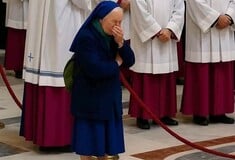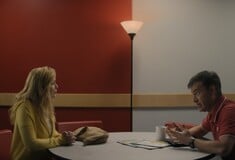Ιστορίες του Καντέρμπουρυ: το δεύτερο μέρος της "Τριλογίας της ζωής"
The Canterbury Tales (Italian: I racconti di Canterbury) is a 1972 Italian film directed by Pier Paolo Pasolini and based on the medieval narrative poem The Canterbury Tales by Geoffrey Chaucer. It is the second film in Pasolini's 'Trilogy of Life', the others being The Decameron and Arabian Nights. It won the Golden Bear at the 22nd Berlin International Film Festival.
The adaptation covers eight of the 24 tales and contains abundant nudity, sex, and slapstick humor. Many of these scenes are present or at least alluded to in the original as well, but some are Pasolini's own additions.
The film sometimes diverges from Chaucer. For example, The Friar's Tale is significantly expanded upon: where the Friar leads in with a general account of the archdeacon's severity and the summoner's corruption, Pasolini illustrates this with a specific incident which has no parallel in Chaucer. Two men are caught in an inn bedroom committing sodomy. One is able to bribe his way out of trouble, but the other, poorer man is less fortunate: he is tried and convicted of sodomy—it doesn't occur to the judge that such an act cannot be committed by one person alone—and is sentenced to death. As a foretaste of Hell, he is burned alive inside an iron cage ("roasted on a griddle" in the words of one spectator) while vendors sell beer and various baked and roasted foods to the spectators.
In Pasolini's version of the fragmentary Cook's Tale, Ninetto Davoli plays the role of Perkyn in manner clearly inspired by Charlie Chaplin.
This film featured Tom Baker in a small role, as one of the husbands of the Wife of Bath.
Cast
Hugh Griffith - Sir January
Laura Betti - The Wife of Bath
Ninetto Davoli - Perkin
Franco Citti - The Devil
Josephine Chaplin - May
Alan Webb - Old Man
Pier Paolo Pasolini - Geoffrey Chaucer
J. P. Van Dyne - The Cook
Vernon Dobtcheff - The Franklin
Adrian Street - Fighter
Derek Deadman - The Pardoner (as Derek Deadmin)
Aπο τη Wikipedia

Λίγα λόγια για το μεσσαιωνικό αφηγηματικό ποίημα του Τσώσερ
The Canterbury Tales is a collection of stories written in Middle English by Geoffrey Chaucer at the end of the 14th century. The tales (mostly written in verse although some are in prose) are presented as part of a story-telling contest by a group of pilgrims as they travel together on a journey from Southwark to the shrine of Saint Thomas Becket at Canterbury Cathedral. The prize for this contest is a free meal at the Tabard Inn at Southwark on their return.
After a long list of works written earlier in his career, including Troilus and Criseyde, House of Fame, and Parliament of Fowls, the Canterbury Tales was Chaucer's magnum opus. He uses the tales and the descriptions of its characters to paint an ironic and critical portrait of English society at the time, and particularly of the Church. Structurally, the collection resembles The Decameron, which Chaucer may have read during his first diplomatic mission to Italy in 1372.
It is sometimes argued that the greatest contribution that this work made to English literature was in popularizing the literary use of the vernacular, English, rather than French or Latin. English had, however, been used as a literary language for centuries before Chaucer's life, and several of Chaucer's contemporaries—John Gower, William Langland, and the Pearl Poet—also wrote major literary works in English. It is unclear to what extent Chaucer was responsible for starting a trend rather than simply being part of it. Also, while Chaucer clearly states the addressees of many of his poems (the Book of the Duchess is believed to have been written for John of Gaunt on the occasion of his wife's death in 1368), the intended audience of The Canterbury Tales is more difficult to determine. Chaucer was a courtier, leading some to believe that he was mainly a court poet who wrote exclusively for nobility
Απο τη Wikipedia
























